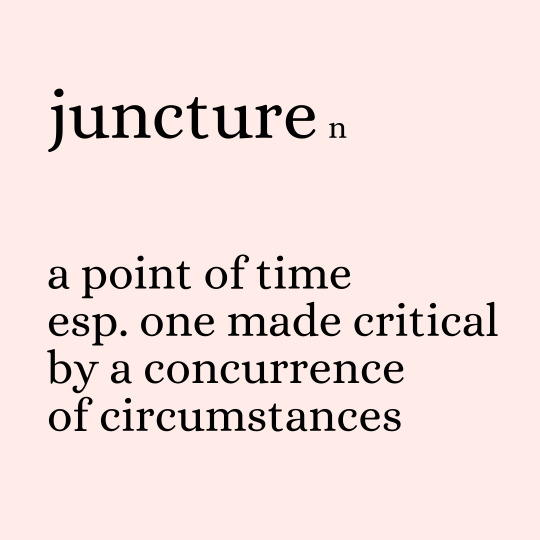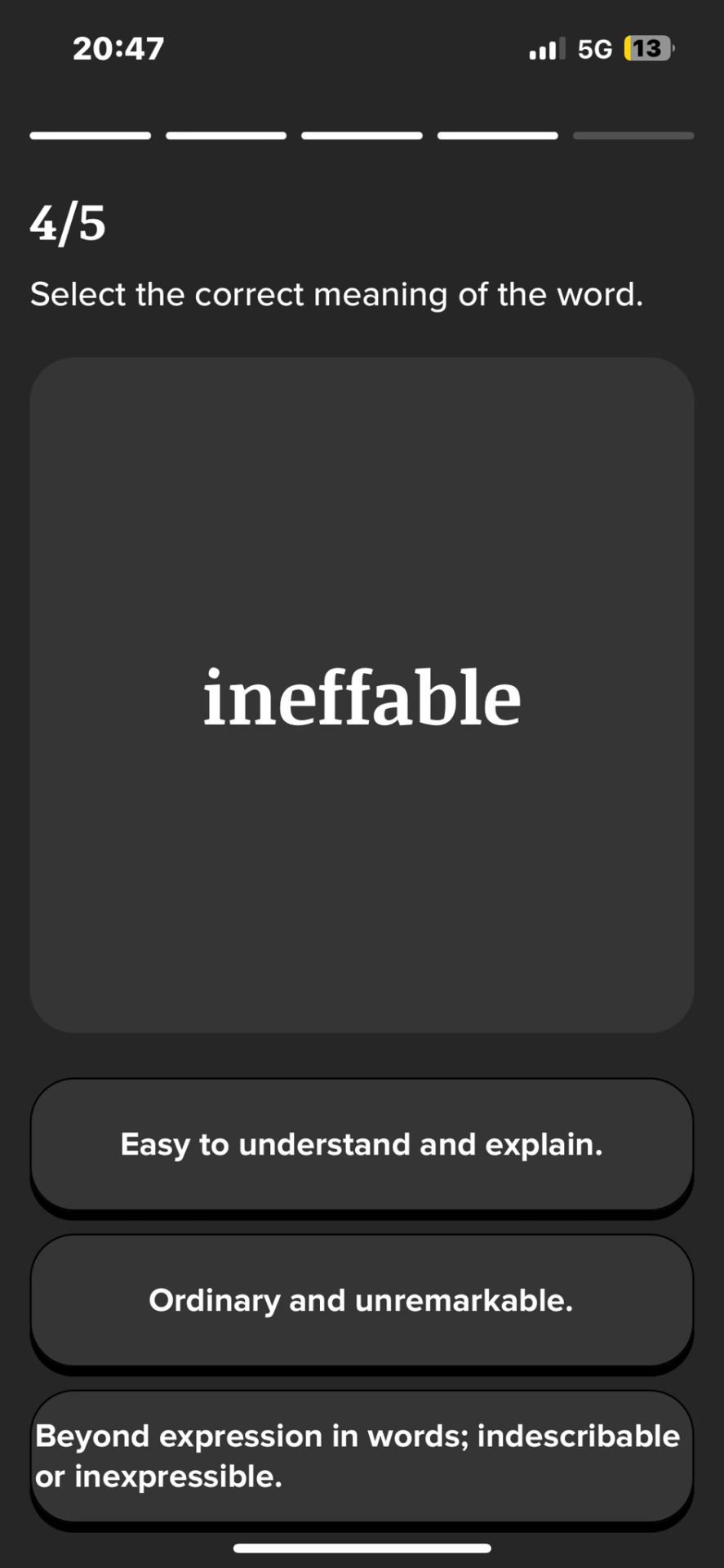#English vocab
Explore tagged Tumblr posts
Text
Rare English Words
Epoch -- a particular period of time in history or a person’s life
Intransigent -- refusing to agree or compromise
Beamish -- bright, cheerful, optimistic
Insouciant -- free from worry, concern, or anxiety
Veridical -- truthful
Effulgent -- shining forth brilliantly; radiant
Venetus -- having the color of the deep blue sea
Orphic -- mysterious and entrancing; beyond ordinary understanding
Eldritch -- eerie; weird; spooky
Esoteric -- intended for or likely to be understood by only a select few; private; secret
Rout -- to howl as the wind; make a roaring noise
Aeonian -- eternal; everlasting
Verendus -- to be feared; worthy of reverence; giving an appearance of aged goodness
#langblr#language#writing#writeblr#writers#resource#resources#writing resources#vocabulary#vocab#english vocab#english vocabulary#rare english words#rare words
3K notes
·
View notes
Text
a list of english words and their meanings because the gre verbal section is kicking my ass
abject: to the maximum degree; (alternatively) completely without pride or dignity
absolve: wash away guilt, obligation, or punishment.
adroit: clever or skillful
apocryphal: of doubtful authenticity, although widely circulated as being true
apposition: the positioning of things side by side or close together
beholden: owing; being indebted or obligated (to someone)
belie: disguise; contradict; failing to give a true notion of something
bloviate: to talk pompously and at length
bucolic: relating to the pleasant aspects of the countryside and country life
circumscribe: to restrict within limits
clemency: mercy
cursory: hasty and therefore not thorough or detailed
derision: scornful ridicule or mockery
desiccate: to remove the moisture from (something)
didactic: intended primarily to teach rather than to entertain
dispensation: exemption from a rule or usual requirement
docile: compliant; obedient; submissive
egregious: outstandingly bad or shocking
emulate: match or surpass (a person or achievement), typically by imitation
entail: require; call for
entreaty: an earnest or humble request
ethos: the characteristic spirit of a culture, era, or community
foil: a person/thing that contrasts with (and as a result emphasizes) the qualities of another
garrulous: excessively talkative, especially on trivial matters
glib: fluent but insincere and shallow
gregarious: sociable; fond of company
hackneyed: overused and unoriginal
idyllic: extremely happy, peaceful or picturesque
imperil: endanger; put at risk of being harmed, injured, or destroyed.
implicate: show (someone) to be guilty or involved in a crime
incorrigible: (a person or habit) cannot be changed or reformed
inept: unskilled, incompetent
intrepid: fearless; adventurous (usually used in a humourous connotation)
irreconcilable: (of two ideas or statements) conflicting; contradictory to each other
jargon: special words or expressions used by a profession or group that are difficult for others to understand
libertine: someone (usually a man) who freely indulges in sensual pleasures without regard to moral principles
librettist: a person who writes the text of an opera or other long vocal works
logorrhea: excessive and often incoherent talkativeness or wordiness
loquacious: talkative
onerous: (of a task or responsibility) involving a great deal of effort, trouble, or difficulty; burdensome
ostentatious: characterized by pretentious or showy display; designed to impress
palpable: tangible; (an emotion or atmosphere) intense enough to be felt
pat: simplistic; superficial and unconvincing
patina: gloss or sheen (on the surface of a metal) due to age or polishing; impression or appearance of something
perfunctory: usually an action, carried out without real interest, feeling or effort
perusal: the action of reading or examining something; scrutiny
pervasive: something unwelcome spreading widely throughout an area or a group of people
philistine: hostile or indifferent to culture and the arts.
polemic: expressing or constituting a strongly critical attack on or controversial opinion about someone or something
poring: to be absorbed in reading or studying (something)
pragmatic: practical; realistic
profligate: extravagant or wasteful in the use of resources
pugnacity: readiness to quarrel or fight
ramification: complex or unwelcome consequence
reactionary: conservative; opposing political or social progress or reform
repudiation: refuse to accept; reject
reticent: reserved; introverted; withdrawn
reverence: deep respect for someone or something (used in religious connotation)
roiling: (for a liquid) to make turbid or to move in a turbulent manner
scant: barely sufficient or adequate
scrupulous: careful, thorough, and extremely attentive to details
skein: length of thread or yard, loosely coiled or knotted; strand; an element that forms part of a complex or complicated whole
skewer: fasten together or pierce with a pin or skewer; subject to sharp criticism or critical analysis
sporadic: scattered or isolated
spurious: bogus; something that is not what it claims to be
staid: solemn; grave; serious minded; quiet
subsume: absorb something into something else
sullen: bad-tempered and sulky
temerity: excessive confidence or boldness
tentative: not certain or fixed; unconfirmed; provisional
tout: attempt to sell or show the merit of something
trite: lacking originality or freshness
truculence: eager or quick to argue or fight
understate: describe or represent (something) as being smaller or less good or important than it really is
vignette: a short description or account of something that expresses its typical characteristics very clearly
78 notes
·
View notes
Text

#english student#learning english#vocabulary#vocabulary list#wotd#noun#english vocab#english studyblr#english#vocab list#studyblr#writeblr
20 notes
·
View notes
Text
allude vs. elude
Allude is a verb that means "to speak of or mention something or someone in an indirect way," as in "they alluded to difficulties at their former school." You might remember this because it starts with the letter A, and alluding to evidence in a school paper with get you an A.
Elude is a verb that most often means "to avoid or escape someone or something by being quick, skillful, or clever," as in "a criminal who has eluded capture." It is also used to mean a fact that you cannot remember, as in "His name eludes me." You can remember this because elude starts with E like escape.
Check out this article for more about these two words.
From Merriam-Webster's List of Most Commonly Confused Words
#merriam webster#language lessons#language learning#english vocab#english language#english learning#learn english#langblr#english#languages#language stuff#vocabulary
10 notes
·
View notes
Text
5 Minutes, 5 Words - #137
🌙☕🥞🧸🩹🦔
Recalcitrant /rɪˈkælsɪtrənt/ (adj.) - having an obstinately uncooperative attitude towards authority or discipline.
Mark was recalcitrant as a teenager, often staying back for detention in high school.
Reprieve /rɪˈpriːv/ (v.) - cancel or postpone the punishment of (someone, especially someone condemned to death).
Derek's death sentence was reprieved by the court.
Rife /raɪf/ (adj.) - (especially of something undesirable) of common occurrence; widespread.
I left the company once I discovered the rife toxicity that was present among the employees.
Sanguine /ˈsæŋɡwɪn/ (adj.) - optimistic or positive, especially in an apparently bad or difficult situation.
Elena's sanguine affirmations carried us through the challenges in the project.
Serendipity /ˌsɛrɛnˈdɪpəti/ (n.) - the occurrence and development of events by chance in a happy or beneficial way.
I always welcome serendipity - unexpected bundles of happiness are the best!
🌙☕🥞🧸🩹🦔
Definitions from: Oxford Languages.
IPA Phonetic Transcription (UK English) from: tophonetics.com
Sentences are fictitious, though they may be based on real issues that occur across the world.
Follow @studyhaus for more vocabulary content!
#englishvocab#exams#essay#english#education#english vocab#study english#english language#success#self improvement#study#study blog#student#leisure#languages#learning#learn#language#knowledge#vocabulary#vocab#satwriting#satreading#sat#actreading#act#high school#gcse#a levels#o levels
98 notes
·
View notes
Text
Word of the day :
MOKITA
meaning - a papua new guinea word, that means a truth that everyone knows but agrees not to speak of.
12 notes
·
View notes
Text
I think I can do polls now so tell me your favorite word for little things
There are so many more so please let me know if your word is not on here
#writing#english vocab#I love little things#and I love words for little things#I could honestly do one of those brackets for this lol#ultimate word for little things#words words words
36 notes
·
View notes
Text

#learning english#english student#vocabulary#vocabulary list#wotd#noun#english vocab#english studyblr#english#vocab list#vocab#writeblr#studyblr
5 notes
·
View notes
Text

I hate it here.
#good omens#crowley#good omens season 2#neil gaiman#gos2#aziraphale#ineffable husbands#english vocab#vocabulary#learn your words damnit
15 notes
·
View notes
Text
Random English vocab I encountered
shore something up - to help or support something that is likely to fail or is not working well
Ex.: The tax cuts are supposed to shore up the economy.
insipid - 1) bland 2) not interesting, exciting or attractive
Ex.: Canned coffees taste either harsh or insipid.
effluent - liquid waste, especially chemicals or sewage
Ex.: In most cases, organic pollution occurs indirectly by anthropogenic eutrophication due to influx of effluent containing nutrient salts after the SAS treatment of wastewater from houses and industries.
enticed - to persuade someone to do something or go somewhere, usually by offering them something that they want
Ex.: This campaign enticed Japanese city dwellers to travel to the countryside by spreading images of idyllic nature and stereotypical pieces of traditional culture.
maverick - an unusual person who has different ideas and ways of behaving from other people, and is often very successful
Kono belongs to a faction of former Prime Minister Aso Taro, yet most LDP elders including Aso are wary of Kono’s "outspokenness and maverick tendencies.”
scullery - a room next to the kitchen in a large house, where cleaning jobs were done in past times
Ex.: The kitchen and scullery had been swept and tidied up, and all the beds made.
to croon - to sing or speak in a soft gentle voice, especially about love
Ex.: A woman gently crooned the tune of a lullaby.
to mothball - to stop using a factory, equipment etc or to not continue with a plan, temporarily but possibly for a long time
Ex.: Language learning app Duolingo to mothball Welsh course.
brogue - 1) an accent, especially an Irish or Scottish accent 2) a thick strong leather shoe with a pattern in the leather
4 notes
·
View notes
Text
Privation
Definition: the state where human necessities are lacking
Sentence: we were in a terrible state of PRIVATOIN during the Great Depression

these guys don't seem to have a lot, or at lease any of the luxuries that we exhibit
Synonym: Deprivation, poverty, hardship
Antonym: excess, rich
16 notes
·
View notes
Text

#english student#learning english#vocabulary#vocabulary list#wotd#noun#writeblr#vocab list#vocab#english studyblr#english vocab#english#studyblr
13 notes
·
View notes
Text
gist
noun, pronounced "jist"
Meaning: Gist almost always appears in the phrase “the gist” and means the general or basic meaning or message of something written or said—in other words, its essence or main point.
In a sentence: "I didn’t catch every word, but I heard enough to get the gist of the conversation."
In history: Gist was borrowed from the Anglo-French legal phrase laccion gist (meaning “the action lies/is based [on]”) in the 17th century, and it was originally used in law as a term referring to the foundation or grounds for a legal action without which the action would not be legally sustainable.
From Merriam-Webster's Word of the Day 1 June 2023
#merriam webster#vocabulary#language learning#learn english#word of the day#english#langblr#english langblr#vocab#english vocab
8 notes
·
View notes
Text
5 Minutes, 5 Words - #147
ッ
Socialism /ˈsəʊʃᵊlɪzᵊm/ (n.) - a political and economic theory of social organization which advocates that the means of production, distribution, and exchange should be owned or regulated by the community as a whole.
Maria lectured her students about socialism today.
Uncanny /ʌnˈkæni/ (adj.) - strange or mysterious, especially in an unsettling way.
Rick, a new friend whom I made over the weekend, has an uncanny resemblance to a bully who made my childhood a nightmare.
Sinister /ˈsɪnɪstə/ (adj.) - giving the impression that something harmful or evil is happening or will happen.
Reena's sinister smile told my subconscious that she was really bad news.
Tumult /ˈtjuːmʌlt/ (n.) - a loud, confused noise, especially one caused by a large mass of people.
The random inflow of pink heart balloons into the auditorium caused a tumult among the audience seated there.
Transient /ˈtrænzɪənt/ (adj.) - lasting only for a short time; impermanent.
Many adolescent relationships are transient.
ッ
Definitions from: Oxford Languages.
IPA Phonetic Transcription (UK English) from: tophonetics.com
Sentences are fictitious, though they may be based on real issues that occur across the world.
Follow @studyhaus for more vocabulary content!
#englishvocab#english vocab#study english#english language#english#school#study blog#self improvement#success#study#students#studying#student#studyblr#study notes#study aesthetic#student life#leisure#languages#learning#learn#language#knowledge#vocab#vocabulary
49 notes
·
View notes
Text
// Word of the Day //
groke
noun (old scot)
meaning - to intently stare at someone while they're eating in a hope that they'll give you a bite
use - my pet keeps groaking at me while i eat sandwiches.
20 notes
·
View notes
Text
The Enigmatic Grimalkin: Unveiling the Esoteric Significance of a Feline Figurine

Have you ever heard of the word "grimalkin"? This word, which is not commonly used today, has a long and fascinating history in the English language. In this blog post, we will explore the origins of grimalkin, its usage in literature, its etymology, and its figurative and literal definitions.
History and Usage:
Grimalkin is an old-fashioned term for a female cat, especially an old or ill-tempered one. The word is not often used in modern English, but it has a long history of use in literature, particularly in poetry and folklore.
For example, in Shakespeare's "Macbeth," one of the witches refers to her familiar, a cat named Graymalkin. Similarly, in the English nursery rhyme "Pussy Cat, Pussy Cat," the titular feline is sometimes called a "grimalkin." Other notable uses of the term include Edgar Allan Poe's "The Black Cat" and Beatrix Potter's "The Tale of Ginger and Pickles."
Etymology:
The etymology of grimalkin is somewhat unclear, but it is believed to come from two words in Middle English: "grim," meaning fierce or cruel, and "malkin," a diminutive form of the name "Mary." The latter is thought to have been a common name for female cats in the Middle Ages, possibly due to the association of cats with the Virgin Mary.
Figurative and Literal Definitions:
In addition to its literal definition as an old or ill-tempered female cat, grimalkin has taken on several figurative meanings over the years. It can be used to describe a woman who is old, ugly, or unpleasant, particularly in appearance or demeanor. For example, "Mrs. Norris was a grimalkin of a woman, with a sour expression and a sharp tongue."
Grimalkin can also be used to describe a person who is cunning, sly, or sneaky, particularly in a negative sense. This usage is often associated with the idea of a witch's familiar, a supernatural being in the form of a cat that helps a witch carry out her magic.
In conclusion, the word grimalkin is a fascinating example of how language can evolve over time. While it is not commonly used today, it has a rich history in literature and folklore, and its figurative meanings continue to resonate with modern audiences. Whether referring to a cantankerous old cat or a shrewd and crafty person, grimalkin remains a powerful and evocative term in the English language.
#Grimalkin#LiteraryTerms#CatLovers#Folklore#Shakespeare#EdgarAllanPoe#BeatrixPotter#FigurativeLanguage#Etymology#LanguageEvolution#Uncommon Words#English Vocabulary#English Vocab#Vocabulary#Moribund Institute#MorEnglish#EnglishMoribundInstitute#English Moribund#Moribund English#ChatGPT#Midjourney
14 notes
·
View notes